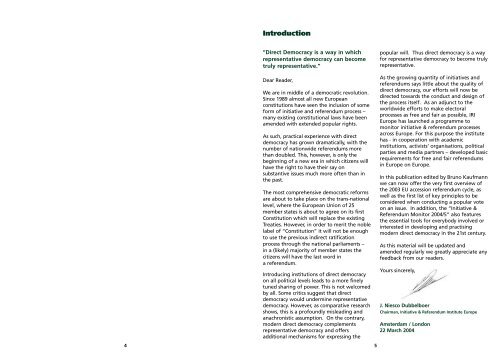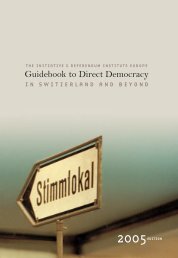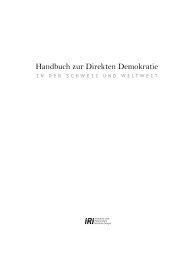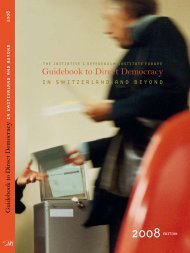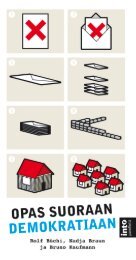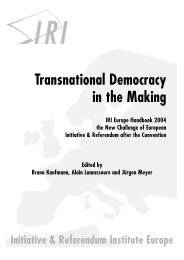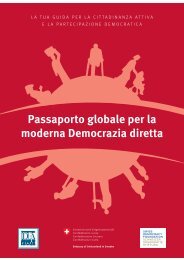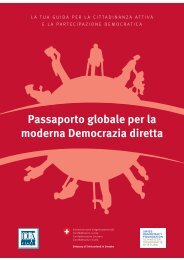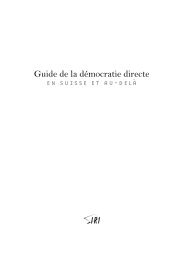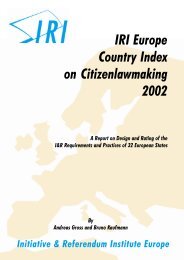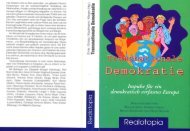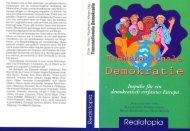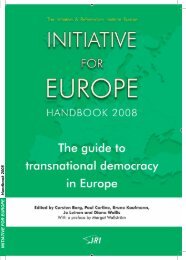Initiative & Referendum Monitor 2004/2005
The IRI Europe Toolkit for Free and Fair Referendums and Citizens’ Initiatives
The IRI Europe Toolkit for Free and Fair Referendums and Citizens’ Initiatives
Create successful ePaper yourself
Turn your PDF publications into a flip-book with our unique Google optimized e-Paper software.
Introduction<br />
“Direct Democracy is a way in which<br />
representative democracy can become<br />
truly representative.”<br />
popular will. Thus direct democracy is a way<br />
for representative democracy to become truly<br />
representative.<br />
4<br />
Dear Reader,<br />
We are in middle of a democratic revolution.<br />
Since 1989 almost all new European<br />
constitutions have seen the inclusion of some<br />
form of initiative and referendum process –<br />
many existing constitutional laws have been<br />
amended with extended popular rights.<br />
As such, practical experience with direct<br />
democracy has grown dramatically, with the<br />
number of nationwide referendums more<br />
than doubled. This, however, is only the<br />
beginning of a new era in which citizens will<br />
have the right to have their say on<br />
substantive issues much more often than in<br />
the past.<br />
The most comprehensive democratic reforms<br />
are about to take place on the trans-national<br />
level, where the European Union of 25<br />
member states is about to agree on its first<br />
Constitution which will replace the existing<br />
Treaties. However, in order to merit the noble<br />
label of “Constitution” it will not be enough<br />
to use the previous indirect ratification<br />
process through the national parliaments –<br />
in a (likely) majority of member states the<br />
citizens will have the last word in<br />
a referendum.<br />
Introducing institutions of direct democracy<br />
on all political levels leads to a more finely<br />
tuned sharing of power. This is not welcomed<br />
by all. Some critics suggest that direct<br />
democracy would undermine representative<br />
democracy. However, as comparative research<br />
shows, this is a profoundly misleading and<br />
anachronistic assumption. On the contrary,<br />
modern direct democracy complements<br />
representative democracy and offers<br />
additional mechanisms for expressing the<br />
5<br />
As the growing quantity of initiatives and<br />
referendums says little about the quality of<br />
direct democracy, our efforts will now be<br />
directed towards the conduct and design of<br />
the process itself. As an adjunct to the<br />
worldwide efforts to make electoral<br />
processes as free and fair as possible, IRI<br />
Europe has launched a programme to<br />
monitor initiative & referendum processes<br />
across Europe. For this purpose the institute<br />
has - in cooperation with academic<br />
institutions, activists’ organisations, political<br />
parties and media partners – developed basic<br />
requirements for free and fair referendums<br />
in Europe on Europe.<br />
In this publication edited by Bruno Kaufmann<br />
we can now offer the very first overview of<br />
the 2003 EU accession referendum cycle, as<br />
well as the first list of key principles to be<br />
considered when conducting a popular vote<br />
on an issue. In addition, the “<strong>Initiative</strong> &<br />
<strong>Referendum</strong> <strong>Monitor</strong> <strong>2004</strong>/5“ also features<br />
the essential tools for everybody involved or<br />
interested in developing and practising<br />
modern direct democracy in the 21st century.<br />
As this material will be updated and<br />
amended regularly we greatly appreciate any<br />
feedback from our readers.<br />
Yours sincerely,<br />
J. Niesco Dubbelboer<br />
Chairman, <strong>Initiative</strong> & <strong>Referendum</strong> Institute Europe<br />
Amsterdam / London<br />
22 March <strong>2004</strong>


